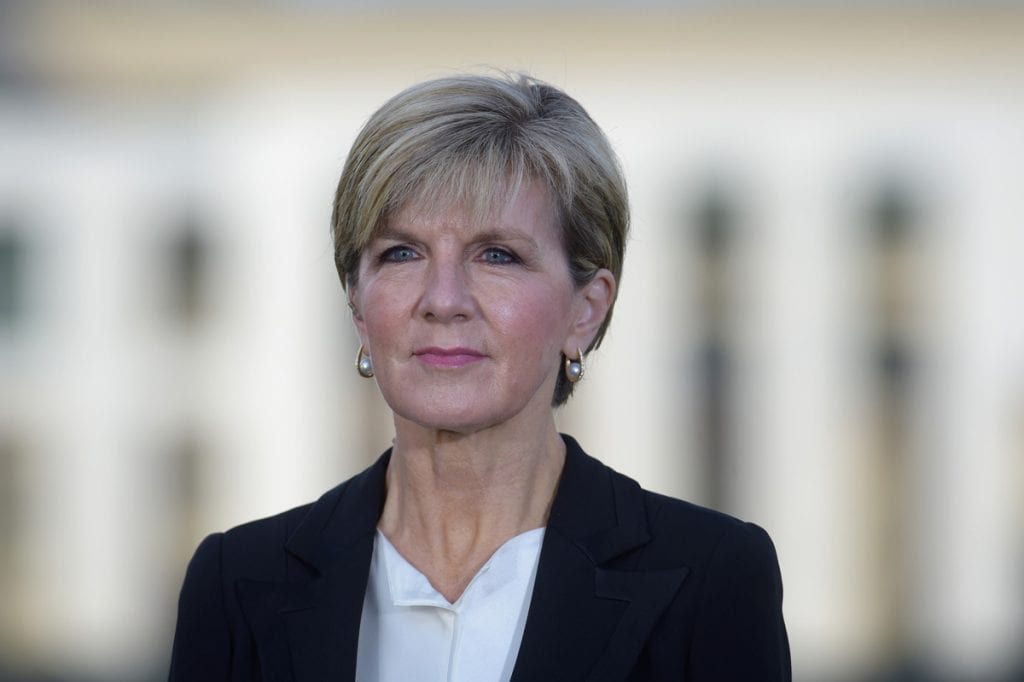Perhaps the perplexing development in the whole chapter was Julie Bishop receiving just 11 votes in the leadership ballot that Dutton triggered. Just nine of her party colleagues, if you take out her and Malcolm Turnbull’s votes, supported her bid to lead the party.
Her credentials – that Bishop had served successfully for five years as foreign affairs minister and eleven years as deputy, that she was easily the most popular candidate and an effective and loyal fund-raiser – make the numbers unfathomable.
Last week Fairfax’s Peter Hartcher asked what would have happened if she were a man:
‘Could you imagine that he would not win the ballot? Of course you can’t.’
You can’t.
In today’s The Sunday Times. @JulieBishopMP sets the record straight. Explosive interview in which she lifts the lid on what really happened at last year’s leadership stouch. “The question was: Who could beat Bill Shorten? And I was confident that I could.” #wapol #auspol pic.twitter.com/QPRfwKBU6T
— Joe Spagnolo (@SpagnoloJoe) March 2, 2019
Over the weekend, having announced her resignation from politics the week before, Julie Bishop spoke openly, for the first time, about that ballot.
“I had commitments from a number of people,” she told the Western Australia’s Sunday Times newspaper . “When I say commitments, a number of people said ‘thank you for calling us. Yes we will support you’.”
If she had known they were being persuaded to support Scott Morrison she says she could have ‘dissuaded’ them. ‘I would have pointed out that the question was: Who could beat Bill Shorten? And I was confident that I could.’
Regardless of that, and their reassurances, she had neither. She was blindsided and realised without Malcolm Turnbull as PM, staying in the portfolio she relished was no longer viable.
“I didn’t want to endorse what had happened and by continuing to accept what had happened I would have been endorsing it,” she explained.
“And also, there had to be a level of trust with your Cabinet colleagues and I thought that had broken down and it would be better for them to have a new team and for me to step back.”
Today I announced that I will not re-contest the seat of #Curtin at the next election. It's been an honour to serve as the member for Curtin, Foreign Minister of Australia & Deputy Leader of @LiberalAus pic.twitter.com/Vqai7ht03K
— Julie Bishop (@HonJulieBishop) February 21, 2019
These revelations shared by Julie Bishop are hardly surprising. They do corroborate many of the simple deductions observers couldn’t help but reach from watching along. And yet her confirmation of the betrayal and disappointment she suffered is powerful.
There were – and still are – commentators and political players who want to pedal the notion that either Bishop was merely ‘deputy’ material or that she didn’t want the leadership. We now know neither are true.
It leaves us to contemplate that not only did the Liberal party overlook the most qualified, popular candidate it had to lead, it didn’t even give her a spot at the start line.
.@billshortenmp on the Coalition: Julie Bishop would’ve been a formidable opponent. She waited in the wings for over 10 years, but when her time came, she was brushed aside. No wonder she’s expressing her frustration.
MORE: https://t.co/906UoF68WZ #weekendlive pic.twitter.com/dBFgeHfD0l
— Sky News Australia (@SkyNewsAust) March 3, 2019
Bishop has famously rejected the ‘feminist’ label. For most of her career she has assiduously avoided conversations about gender: she simply focused on doing the best she could, presumably believing that if she didn’t make a deal about her gender neither would her colleagues. If only it were true.
On the evening when Julia Gillard was deposed by her party as PM, back in June of 2013, she uttered the now famous words about her being a woman: “It doesn’t explain everything. It doesn’t explain nothing. It does explain some things.”
The brutal reality when it comes to Julie Bishop being set aside by the Liberal party last year is that her being a female explained almost everything. It is fanciful to pretend otherwise. A deputy of Bishop’s calibre and experience would never have been cast aside so blatantly had he been a man. She might not have won that ballot but not even being in contention, when she wanted it, and had told her colleagues as much, is telling.
As a result, Australia lost a fine foreign minister and parliament one of the most senior and experienced females. With Bishop’s exit the Liberal party may well have lost its only credible chance at the coming election but it’s certainly proved just how flimsy its claim to ‘merit’ really is.


